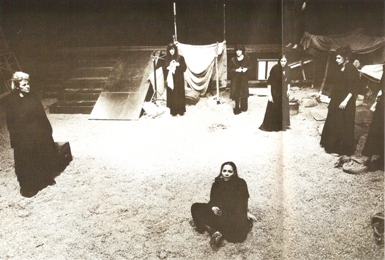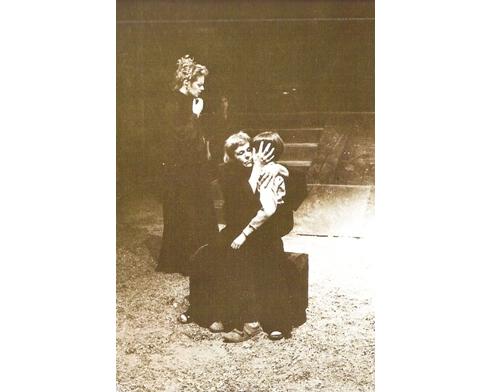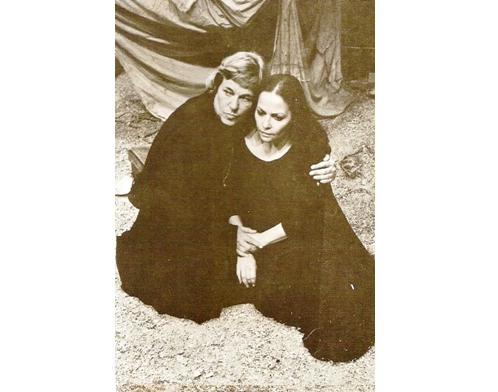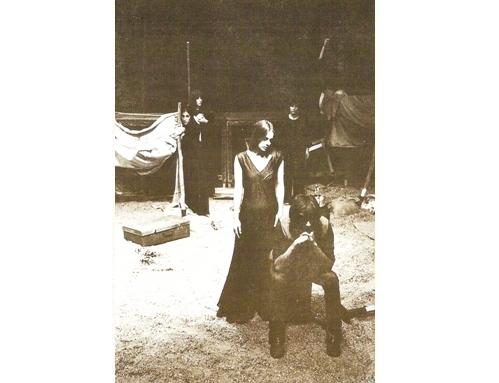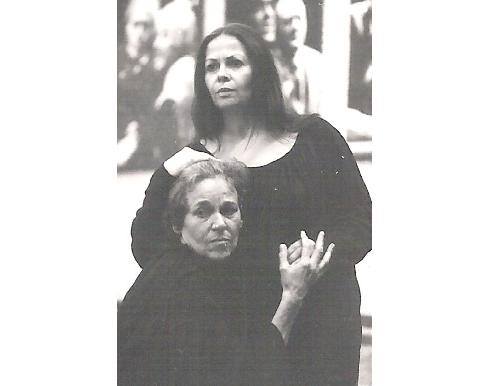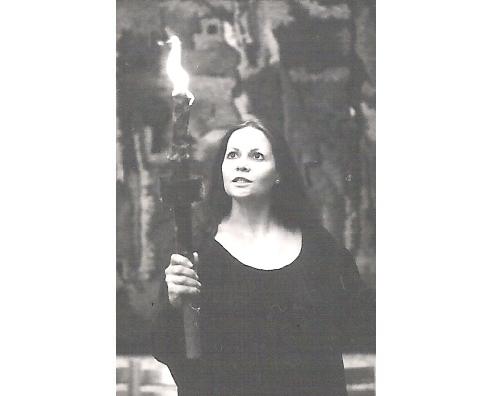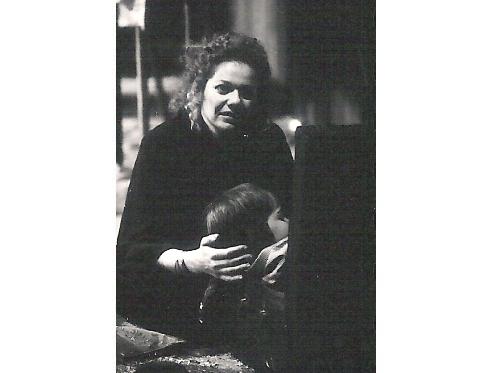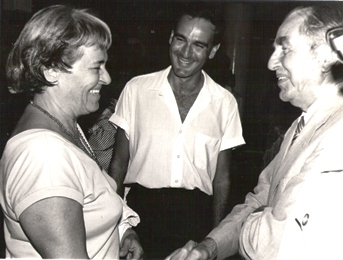נשי טרויה
- הצגה מספר: 358
- הצגת בכורה: 19/02/1983
- מספר הצגות שהועלו: 123

יוצרים
- מאת: אוריפידס, ז'אן פול סארטר
- תרגום: אלי מלכא
- בימוי: הולק פרייטג
- תפאורה ותלבושות: אנגליקה אדינגן
- מוסיקה: עופר שלחין
- תאורה: נתן פנטורין
שחקנים
- פוסידון: אלי דנקר, עמי טראוב
- פאלאס אתינה: ענת הרפזי
- הקובה: אורנה פורת
- טלתיביוס: אהוד (אודי) בוכמן
- קסנדרה: גילה אלמגור-אגמון, דליה פרידלנד
- אנדרומכה: רזיה ישראלי
- מנלאוס: אלי דנקר, עמי טראוב
- הלנה: ענת הרפזי
- מקהלת נשי טרויה: אהובה קרן, אמירה פולן, ג'ואנה רייס, מלי סיסו
- אסטיאנכס: דן לוינטל
- חייל: יורם סבו
על ההצגה
נסיך טרויה חוטף את אישתו של מלך ספרטה. זוהי עילה למלחמה. עמי יוון מתאחדים ומטילים מצור על טרויה. אחרי עשר שנות מצור, רגע לפני שהיוונים נסוגים, מציע אודיסאוס תחבולה. הצבא מעמיד פנים שהוא עוזב את חופי טרויה ומשאיר לכאורה מתנה לפיוס האלים, סוס עץ ענק בו מסתתרים לוחמים. הטרויאנים חוגגים את הניצחון ומכניסים את הסוס לעירם. באמצע הלילה יוצאים הלוחמים מהסוס, פותחים את השערים לצבא יוון ומחריבים את טרויה. על רקע חומות העיר העולה בלהבות אנו מתוודעים לנשי טרויה.
טַלְתִיבּיוֹס, שליח הצבא היווני, מודיע להֶקוּבָּה, מלכת טרויה, כיצד יאבדו היא וכל בנות עמה את חירותן. אחרי שקברו את הגברים הן מובלות לספינות של היוונים, רוצחי יקירהן. הן השלל. תכף תהפוכנה לשפחות. קסנדרה, בתה של הֶקוּבָּה, צוהלת משמחה כשנודע לה שאגממנון, מלך יוון, רוצה בה כפילגש. כולם חושבים שהשתגעה, אולם היא יודעת שאיחודה לאגממנון יביא למותם המשותף. למען הנקמה היא מוכנה להקריב את עצמה. אנְדְרומַכַה, אשת הֶקְטור הגיבור, בנה של הֶקוּבָּה, מחבקת את בנה התינוק, יורש העצר האחרון למשפחת המלוכה. היוונים דורשים לקחת את התינוק כדי להשליכו מהחומות. הלנה, שבעתייה פרצה המלחמה, נלחמת על חייה מול מֶנֶלאוס, בעלה הנבגד.
ובין כולן עוברת הֶקוּבָּה. ממלכה המחוייבת לכבוד ולשמירת כללי הטקס הופכת הֶקוּבָּה לאם המתייפחת על מות ילדיה, אישה חסרת עכבות, שלא מוכנה לקבל את שרירותיות מעשיהם של הגברים ואת מחיר המלחמה.
ב - 18/02/2023, לציון ארבעים שנה להפקה, שלח הבמאי הולק פרייטג מכתב לשחקנים וליוצרים, אשר היו שותפים לאחת ההצגות המשמעותיות ביותר, לפי דבריו, בקריירה הענפה שלו. פרייטג אף הציע לקיים קריאה של המחזה עם הצוות המקורי לכבוד המאורע. הצעה זו, לא יצאה אל הפועל.
Bad Hersfeld, Germany, February 18th 2023
,Dear magnificent colleagues
this Sunday forty years ago, meaning the 19th of February 1983, we celebrated the premiere of The Trojan Women. I have never forgotten (and I never will) the feeling of relief after the final curtain fell – the impact that the play and your beautiful acting had on the audience – also, of course, the tremendous applause we received. I remember that I had told the set designer, Angelika Oedingen - who I had brought with me from Stuttgart, Germany -, that we would not step out with the actors because I didn´t want the audience to boo the actors – if they would boo someone, it should be Angelika and me. Now, it turned out quite different and up to this day this premiere is still dearest to my heart! In fact it is one of the three or four adventures that were worth to spend a life in the theatre - which I did. This year I´m going to be eighty years of age - a good occasion to look over what I´ve done and - more important - to revisit the people that were important. Among those you are on top of the list
Before I started this mail I went into my private little archive and I found this tricky little book, which some of you might even remember: And, of course, I started reading and remembering. Going through my notes from forty years ago the whole production came back to my mind. Then I went to my working room and picked the DVD from 1983. I revisited the past and for an hour and a half we were once again together in the Habimah. What a reunion that was
Very vividly I remember our first meeting in the Habimah – you remember it was just a few months after the first Lebanon war – when I said that we should actually go and visit Troy in order to catch the spirit of the play, after all it´s not that far from Tel-Aviv, Shauli added – and I can still hear him – „wait a few months and we can get there without a visa“. Today, forty years later, I confess that I was seldomly as nervous as in the beginning of the rehearsals for „The Trojan Women“. There were two reasons for it: first of all it´s always
difficult to start a second show if the first one was a success and secondly the mere fact that I wanted to bring the production as close as possible to the political situation at the time. Looking back from our days it seemed almost fantastic how everybody in the Habimah collaborated. For instance our idea to place the play in a Palastine refugee camp and to put the Greeks in Israeli uniforms was quite risky – but everything seemed possible and never again did I have original army weapons on the stage for any of my productions. And then: do you remember one of the last run-throughs of the play when they put real gasoline in Orna´s canister and she poured it all over herself. Fortunately the statist who opened the show by putting on the fire added not enough fuel paste, so that it was out when the accident happened – otherwise I still don´t want to imagine what could have happened. And so I could go on and on remembering details
It was quite an experience today – seeing you all forty years ago and still recalling the spirit. For a moment it was like it was 1983 again and a deep feeling of gratitude for all of you: you made it possible and I thank you for ever
As most of you might know I offered to do a reading of the play with everyone from the original cast who is still around. Gila would take over from wonderful Orna. After all the present political situation in Israel again asks for peace initiatives – and nothing else was the background thought in 1983
Unfortunately the Habimah didn´t even answer, which makes me really sad. read this letter
I hope you are well and maybe we will meet again some day – until then stay healthy and be good to yourself
,Yours always
Holk
תמונות מהצגה
ביקורות
"הטקסט הוא חגיגי, לא שיחתי כי אם פיוטי וחזוני ועם זאת מלא עוצמה וחיים דרמטיים עזים. אורנה פורת בתפקיד הקובה מעצבת את אחת הדמויות המצויינות ביותר בקריירה הבימתית שלה. היא מלכותית, מקרינה כאב גדול ויחד עם זאת כוח עצום לבולמו ולרסנו ולהישאר מלכה גם בשבייה ובהשפלתה. גילה אלמגור כקסנדרה צריכה ליצור רושם כפול : מצד אחד דמותה של אישה צעירה ונפחדת ומצד שני דמות כוהנת אפולו שדבר האל מפעים אותה ומפיק מתוכה כוח עצום.
רזיה ישראלי משחקת ברגישות את תפקיד אדרומאכה. ענת הרפזי נאה מאוד כהלנה. הבימוי של הולק פרייטג הוא תכליתי, חריף ועוצר נשימה עד הסיום.
"לראשונה מזה זמן רב ראיתי קהל יושב ב'הבימה' מרותק במשך שעה ומחצה ללא הפסקה. יש לשער שאין זה רק בגלל סיפור הזוועות היווני אלא בעיקר בגלל האופן שבו בחר הבמאי הולק פרייטג להציג את העיבוד של סארטר. אורנה פורת מגישה את הדמות המורכבת והמעניינת ביותר. נסיון של שנים עוצב בידי השחקנית לתפקיד מרשים ומרגש. אלי דנקר הפתיע בעיצוב מעולה של דמות מנלאוס הכובש : ערמומי, טיפש וזהיר. דנקר מגיש ביצוע מושלם. גם אהוד בוכמן טוב בעיצוב החייל טלתיביוס. את רזיה ישראלי ראוי לזכור בעיקר במונולוג אל הילד.
גילה אלמגור, קסנדרה, תפסה כיוון נכון של מטורפת משיחית, אבל זה טירוף חסר בסיס קונקרטי. מונולוג נבואת החורבן הוא מעשה חושב של העמדה יותר מאשר של ביצוע שחקני ויש לצפות להעמקה. מבין נשות המקהלה, ראוי לשים לב לאמירה פולן בעיצוב דמות מעניינת של חיית המון נואשת. אוריפידס מספק את הרעיון הכללי ואת הריגוש הבסיסי. פרייטג הופך אותו לאמירה בוטה ומסויימת מאוד. בסך הכל זהו תיאטרון חברתי במובן הטוב. מומלץ.

